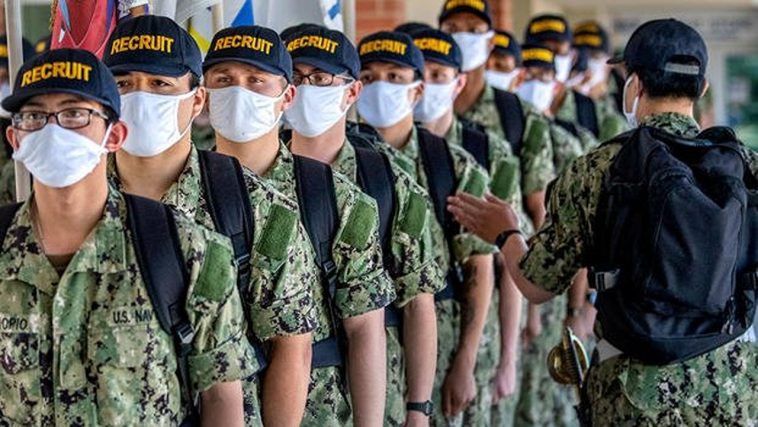LISTEN HERE:
Pondering the hypothetical scenario of an attack on American soil, it’s unsettling to question whether the citizens of this great nation would rise up in its defense. Recent global events, such as Hamas’ assault on Israel, have shockingly elicited sympathy from a portion of the younger population towards those at odds with our nation, providing a potential clue to this riddle.
A curious trend has emerged on platforms like TikTok where younger users echo the beliefs and propaganda of controversial figures like Osama bin Laden, who orchestrated the tragic 9/11 attacks. Moreover, anti-American sentiment seems to be festering on college campuses, sparking a concerning question: ‘Would they stand up for their homeland in crisis?’
Based on a recent study, it appears that a sizable majority might watch from the sidelines. Echelon Insights, a reputable research firm, conducted a poll which uncovered that an astonishing 72% of Americans would refrain from volunteering in a combat scenario.
This striking statistic surfaces amidst reports that the respective branches of the U.S. military face challenges reaching their recruitment objectives – a possible indication of a rising tide of indifference to serving in the armed forces.
Another unsettling survey result revealed that nearly one-third of the youngest adult demographic, those aged 18 to 29, would choose capitulation over defending their homeland. Unraveling the reasons behind such a stance isn’t overly complex.
Education institutions have unfortunately become saturated with viewpoints that criticize American ideals and principles. Coupling this with a culture that seeks to shelter the young from uncomfortable realities, the result is a generation disinclined towards personal sacrifice for the common good.
Reinforcing these worrisome trends, Justin Henderson, a military recruiter, brought the reality of current geopolitical situations to light in an interview with Newsweek. He spoke of America’s military presence near Israel and involvement in two wars, emphasizing that even now, there is a need for strong, willing soldiers. The shifting sands echoing in the Taiwan Strait only add to these uncertainties, making this period especially crucial.
The ripple effects of these recruitment challenges may pose significant obstacles should America face military conflict. Esteemed senior fellow at the Center for a New American Security and former Navy attack submarine commander, Tom Shugart, expressed his concerns to Newsweek. He highlighted the difficulties that could ensue if, for instance, insubstantial Navy enrollment led to a shortage of trained personnel to manage crucial military operations like submarines and aircraft. In the event of a conflict, training replacements would consume valuable time.
However, some argue that these numbers could shift dramatically if the nation were in a state of war. Shugart expressed skepticism about the accuracy of the aforementioned polls, underscoring that the reasons leading to conflict could significantly influence citizens’ willingness to serve. Before the searing experience of 9/11, he noted, the military didn’t frequently cross most Americans’ minds, indicating the potential for attitudes to significantly shift when necessity calls.
David Eustice, CEO of Military Recruiting Experts, echoed this sentiment in conversation with Newsweek. Exploring the historical trend of resistance followed by acceptance in times of conflict, he emphasized that when Americans are convinced of the moral and strategic merit of a war, they tend to rally to the cause. A decline in military enrollment is a complex issue, and doesn’t necessarily reflect on their willingness to rise when it matters most.
Another contributing factor to the decline in military interest among the younger generation could be down to the rise of digital platforms which give instant gratification, argued Henderson. He observed his own children getting the ‘dopamine hit’ from witnessing physical feats via videos online, while their bodies remain unexercised. Such a disconnect could partially explain this demographic’s reluctance towards military service.
Furthermore, the younger generation has fewer direct interactions with military personnel, fueling an unfamiliarity with service life. Part of the glory of joining the military comes from the familial tradition of service, a culture that seems to be dwindling in our modern society. Eustice shared that seven out of his ten siblings served in the military, following the footsteps of their father, a Korean War veteran – an atypical family structure in this day and age.
Justin Henderson is currently a senior vice president at RecruitMilitary. He shed light on how the tidal wave of modern technology has transformed communication norms, making it increasingly challenging for military recruiters to engage with the younger populace. Face-to-face dialogues, which were once the standard mode of communication, have seen a drastic reduction.
As the world advances digitally, opportunities for authentic, person-to-person interaction are dwindling. Henderson shared that such candid conversations, crucial in demonstrating the value and purpose of military service, are becoming increasingly rare.
These shifting recruitment patterns and attitudes towards the military among younger Americans underscore the need for a renewed approach to engagement. It’s essential to convey the honor and patriotism ingrained in serving one’s country and to foster an understanding and appreciation for what military service entails.
While the defense readiness of America continues to stand tall, with a military force equipped and prepared to tackle any challenge, the changing inclinations of the younger generation cannot be ignored. Taking note of these trends, proactive efforts must be employed to cultivate the spirit of patriotism among them and to ensure the continuity of a strong, stalwart defense.
Casting a somber but hopeful eye towards American resilience throughout history, it becomes clear that this nation has time and again risen from the ashes. Let’s remain optimistic that, when called upon, the flame of American valor and commitment to defend our cherished freedoms will once again be ignited, proving that this great nation will always stand strong, united, and unyielding.



